CORRECTION: This article was corrected on April 11 at 1:55 p.m. CDT. It originally stated that “From the river to the sea, Palestine will be free” is a phrase of English origin. Though the phrase was popularized by pro-Palestinian demonstrators in the West, its roots can be traced to similar phrases in Arabic.
Students participated in a walkout and protest led by Vanderbilt Divest Coalition on April 8 at 12 p.m. CDT to demand that the university reinstate students who were suspended and expelled due to their involvement in a sit-in at Kirkland Hall. The protesters expressed their frustration with the results of the student accountability hearings released on April 5, in which the university expelled three students, suspended one and placed 22 others on disciplinary probation.
VDC began organizing the walkout when Provost C. Cybele Raver sent the disciplinary notice to the Vanderbilt community, according to a VDC organizer being kept anonymous for protection from retribution. They said the goal of the walkout was to combat administrative efforts to silence protesters.
“[The walkout] is in support of those students, standing up against not only the suppression of students but the canceling of the referendum and this narrative that they’re trying to ignore what they’re doing,” the VDC organizer said.
Students gathered in front of the Harold Stirling Vanderbilt statue on Library Lawn, where they began chanting and holding up signs and banners calling for the end of the conflict in Gaza and for students’ expulsions and suspensions to be overturned.
A group of faculty members also gathered next to students protesting on Library Lawn. Kenneth MacLeish, associate professor of anthropology and medicine, health and society, said the administrative actions against students, including the expulsion of three students, led to “diverse” discussion within his classes.
“From my perspective, it’s important as a faculty member for us to support our students when we see them expressing values that we see as being in line with the kinds of things that we teach and the things that we understand to be important values of Vanderbilt as an institution,” MacLeish said. “That includes concern for injustice, the suffering of others, the responsibility or relationship of our institutions…[and] the right to protest.”
At 12:20 p.m. CDT, the protest moved to Rand Yard, the same location as the former “Apartheid Wall” exhibit from March 18-24. Members of VDC spoke to the crowd and relayed messages from those facing disciplinary action.
Student speakers delivered statements on behalf of students who could not attend due to disciplinary restrictions. In an email to The Hustler, Student Affairs clarified that some of those issued probations, suspensions and expulsions have “certain restrictions” in place that will continue throughout the 10-day appeal period, though all who are appealing are permitted to attend class.
“Lots of students still in the accountability process didn’t show up for fear of more arbitrary sanctions,” a formerly suspended student, granted anonymity for protection from academic retribution, said.
The university declined to specify if students are allowed entry to their dorms or Campus Dining locations. However, it does state that university support is available depending on circumstances, which includes “additional financial aid” or “personalized” dining accommodations.
At 12:54 p.m. CDT, protesters marched to the front steps of Kirkland Hall, where students have been camping since the inside sit-in ended on March 27. The protest officially concluded around 1 p.m. CDT, but VDC organizers stated they would remain outside Kirkland Hall for the foreseeable future.
According to another VDC organizer, who is being kept anonymous for protection from retribution, protesters will continue to camp outside of Kirkland Hall until their demands for Vanderbilt administration are met.
“We’re gonna remain outside of Kirkland,” the VDC organizer said. “As long as it takes — until the disciplinary proceedings are over, until the expelled students are back on campus, until the referendum is reinstated.”
Several protesters said they joined the walkout due to their personal views on the university’s disciplinary actions.
“My friends have been kicked out and suspended for peaceful protest, and I’m here to support them,” one protester, granted anonymity for protection from retribution, said.
Others said they disagreed with certain aspects of the sit-in but were disappointed with the outcome regarding the disciplinary process.
“I don’t think they did everything right, but I think expulsion was too harsh,” another protester said.
Rabbi Shlomo Rothstein, director of Vanderbilt Chabad, was hosting a weekly booth at Rand Wall when the sit-in marched to Rand Yard. Rothstein said he took issue with the chants and rhetoric used by protesters, labeling them as antisemitic and stating that protesters were calling for the “destruction of innocent lives” through activist phrases.
“Chanting ‘from the river to the sea’ means destroying Israel in its entirety,” Rothstein said. “This means no Jerusalem, no Israel. They are chanting for actual genocide, while Israel wants peace.”
“From the river to the sea, Palestine will be free” is a phrase used by many pro-Palestinian demonstrators globally as a rallying cry. The Anti-Defamation League considers the phrase an antisemitic slogan due to its use by Hamas and the Popular Front for the Liberation of Palestine, groups many Western nations have deemed terrorist organizations. It views the push for a Palestinian state spanning the region to be a simultaneous call for the eradication of Israel.
Protesters who have used the phrase in recent years argue it serves only to call for Palestinian self-determination, pushing back against views that frame Israeli and Palestinian statehood as mutually exclusive.
Members of Chabad began chanting the Sh’ma prayer around 12:38 p.m. CDT, as well as responding to protesters’ chants of “free Palestine” with “from Hamas.” According to Rothstein, Chabad members felt compelled to also voice their pride in their Jewish identity while the protest was ongoing.
“We were caught off guard and very disturbed. Many students who came by were also disturbed,” Rothstein said.

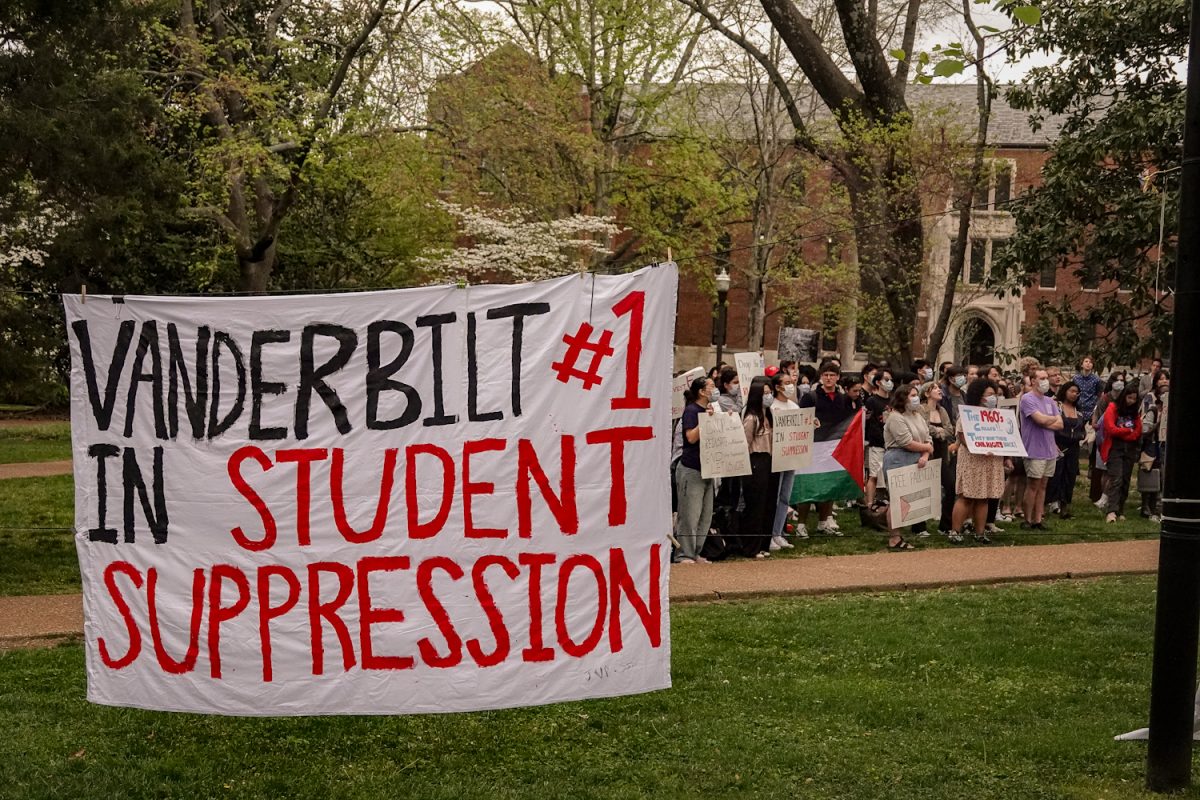


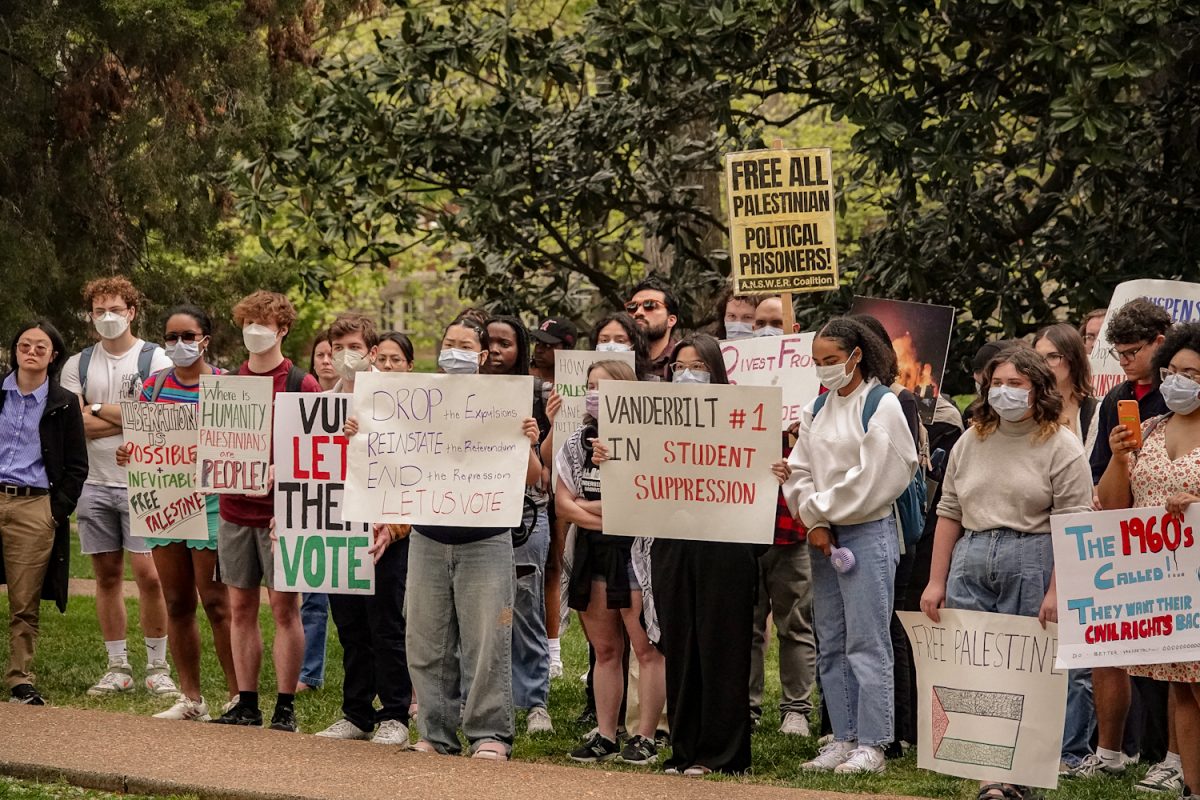
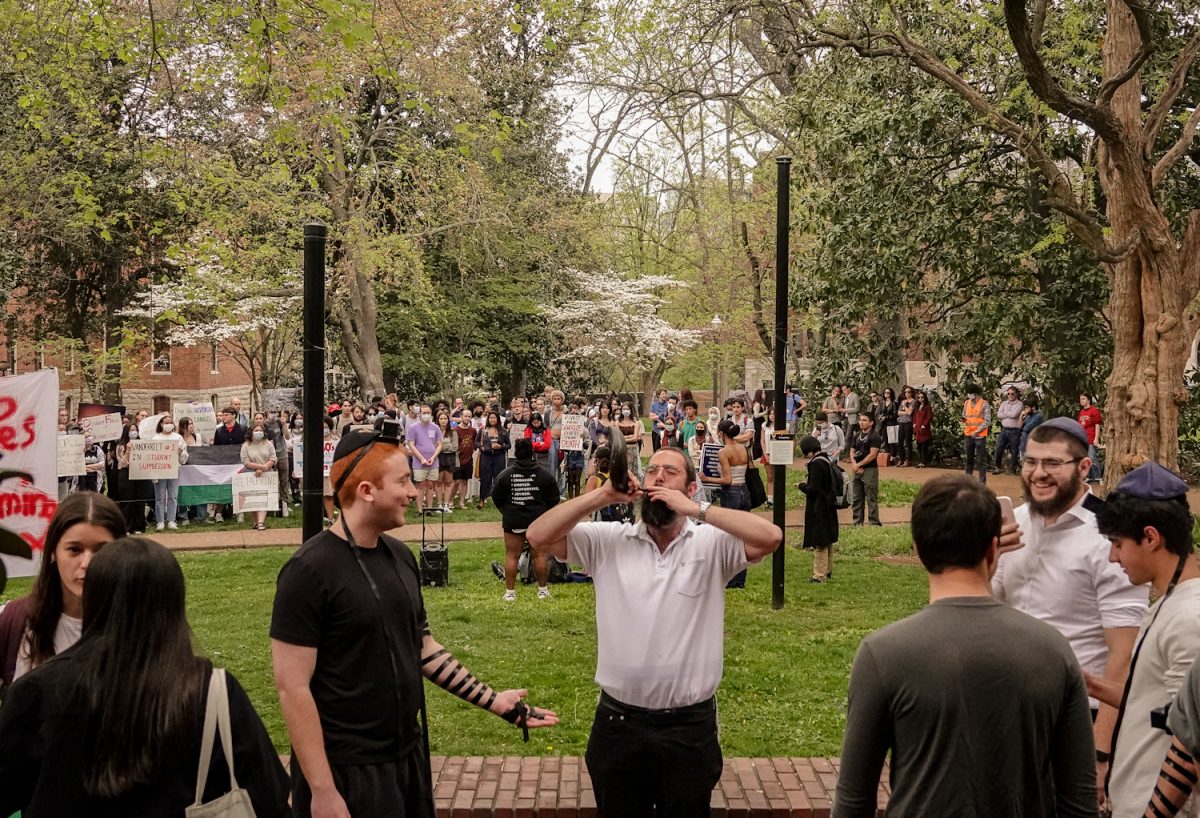

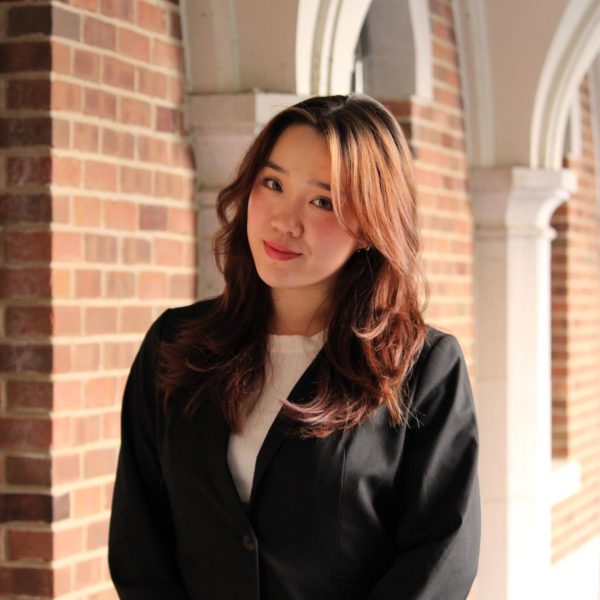
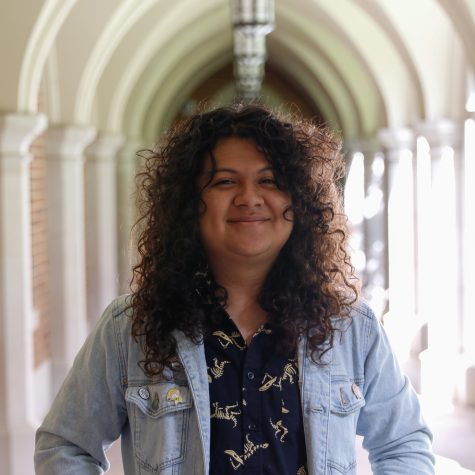
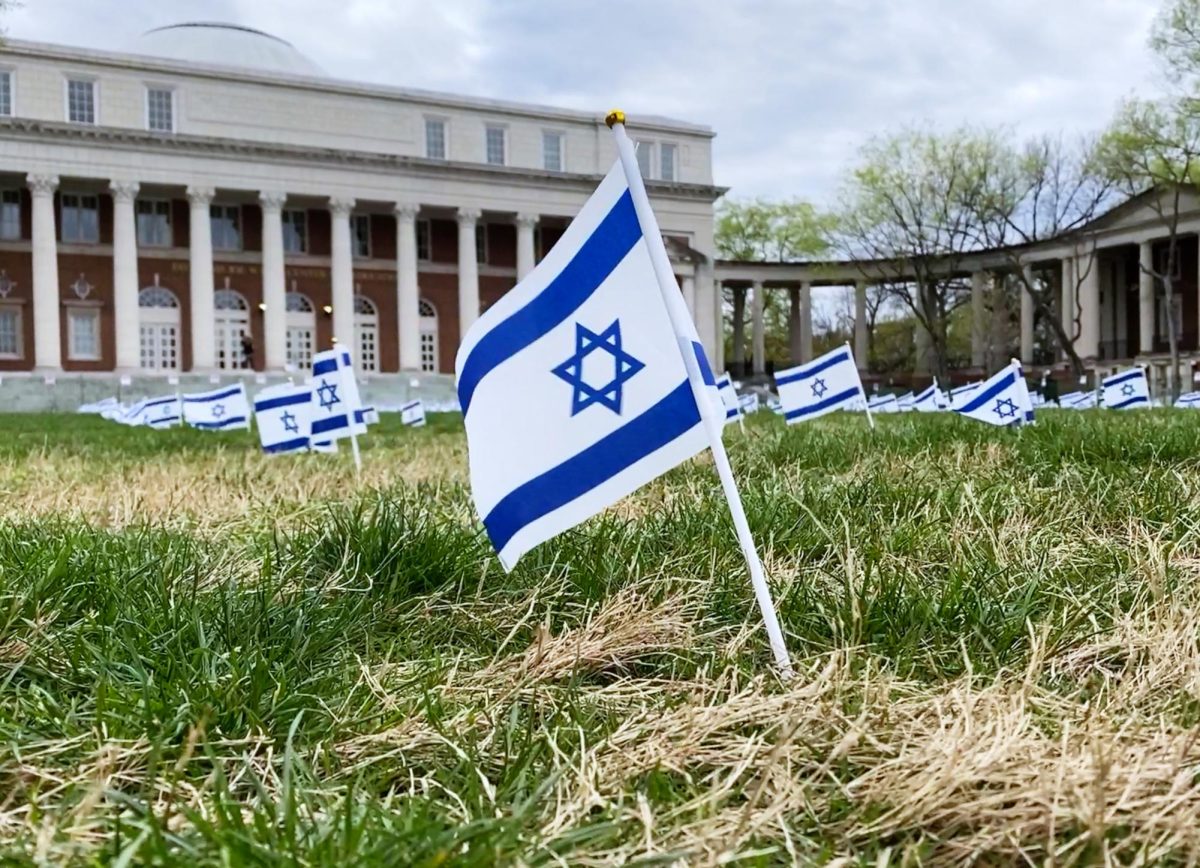
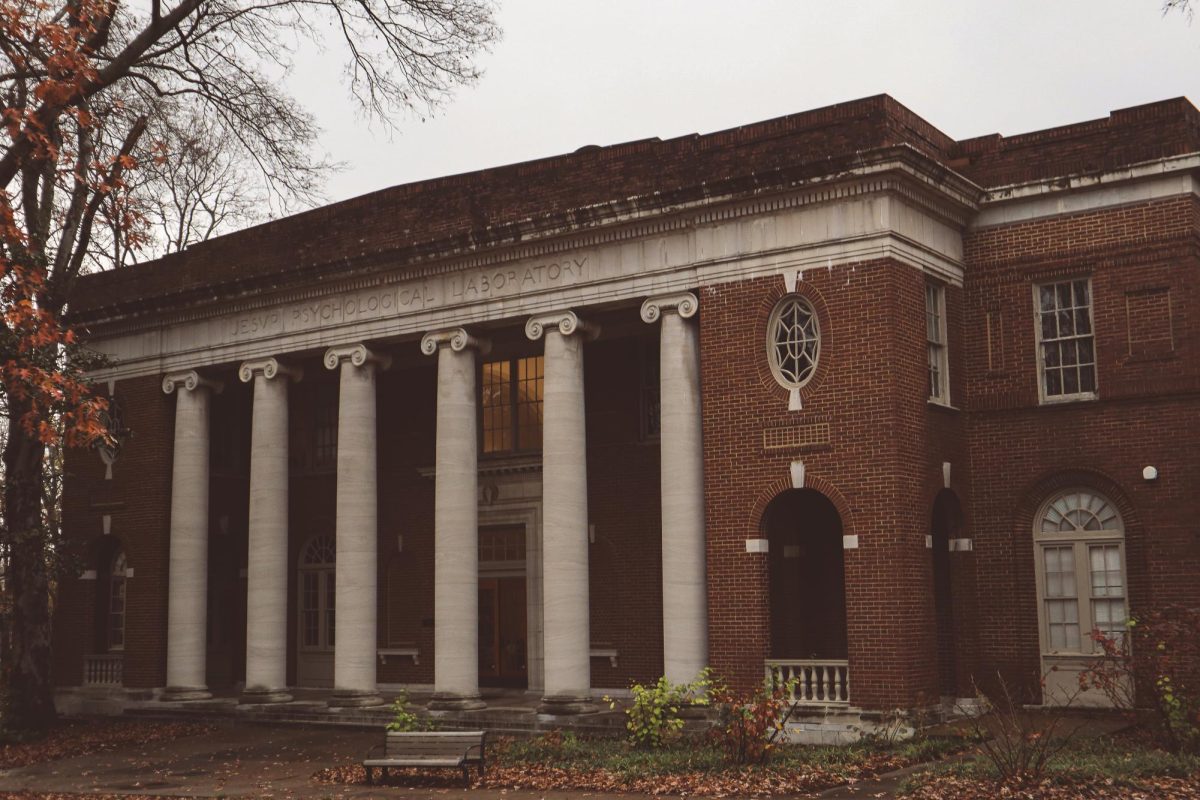
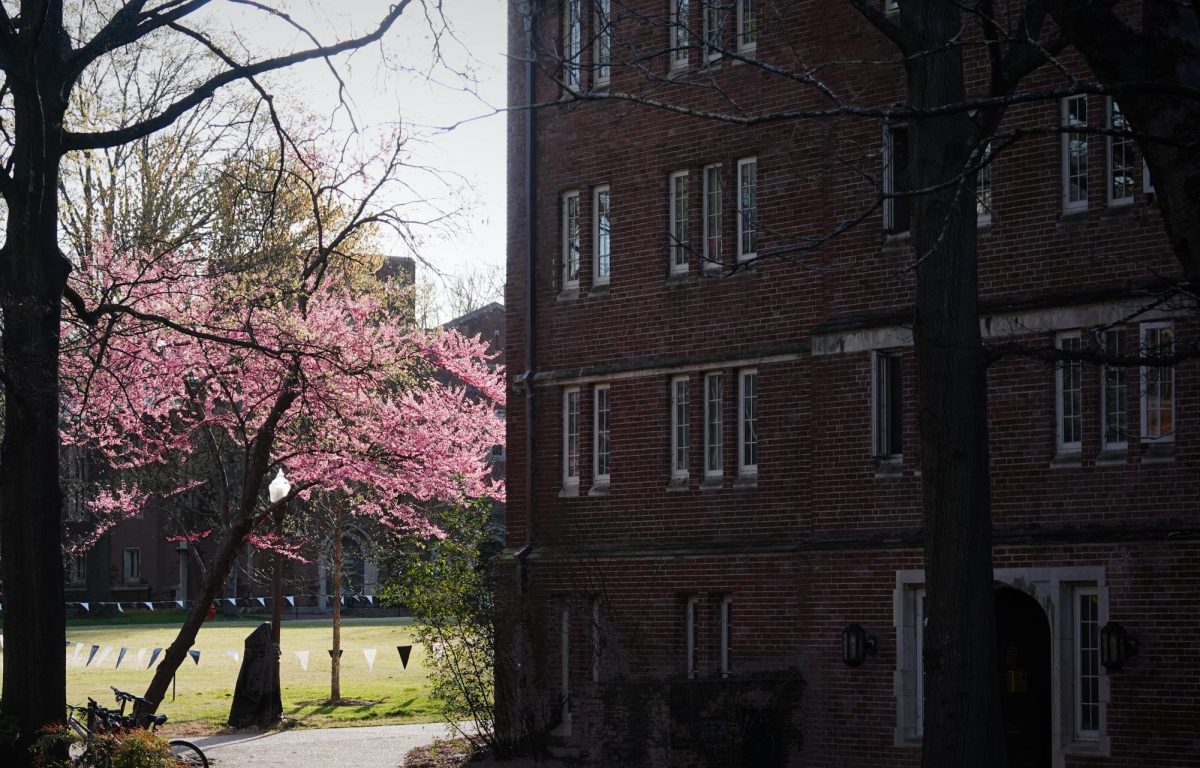
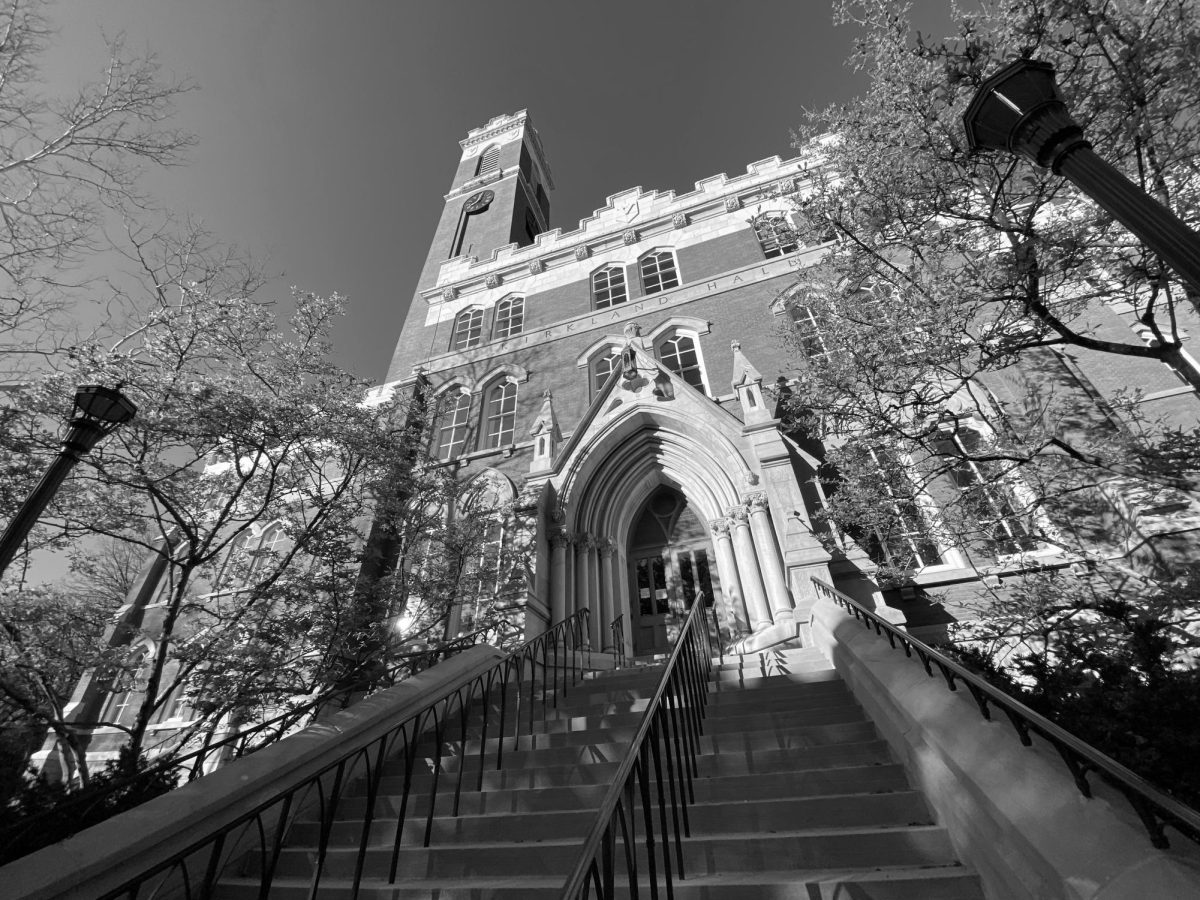

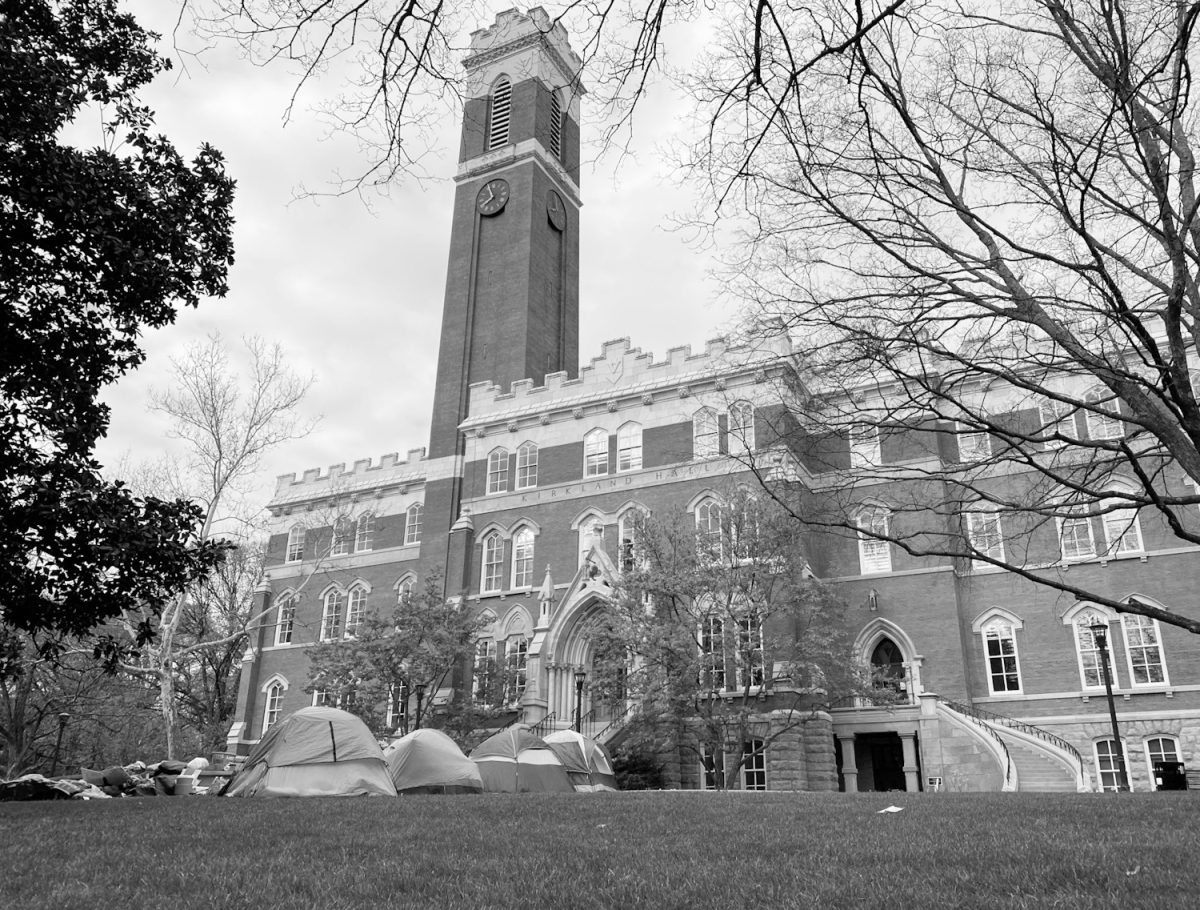
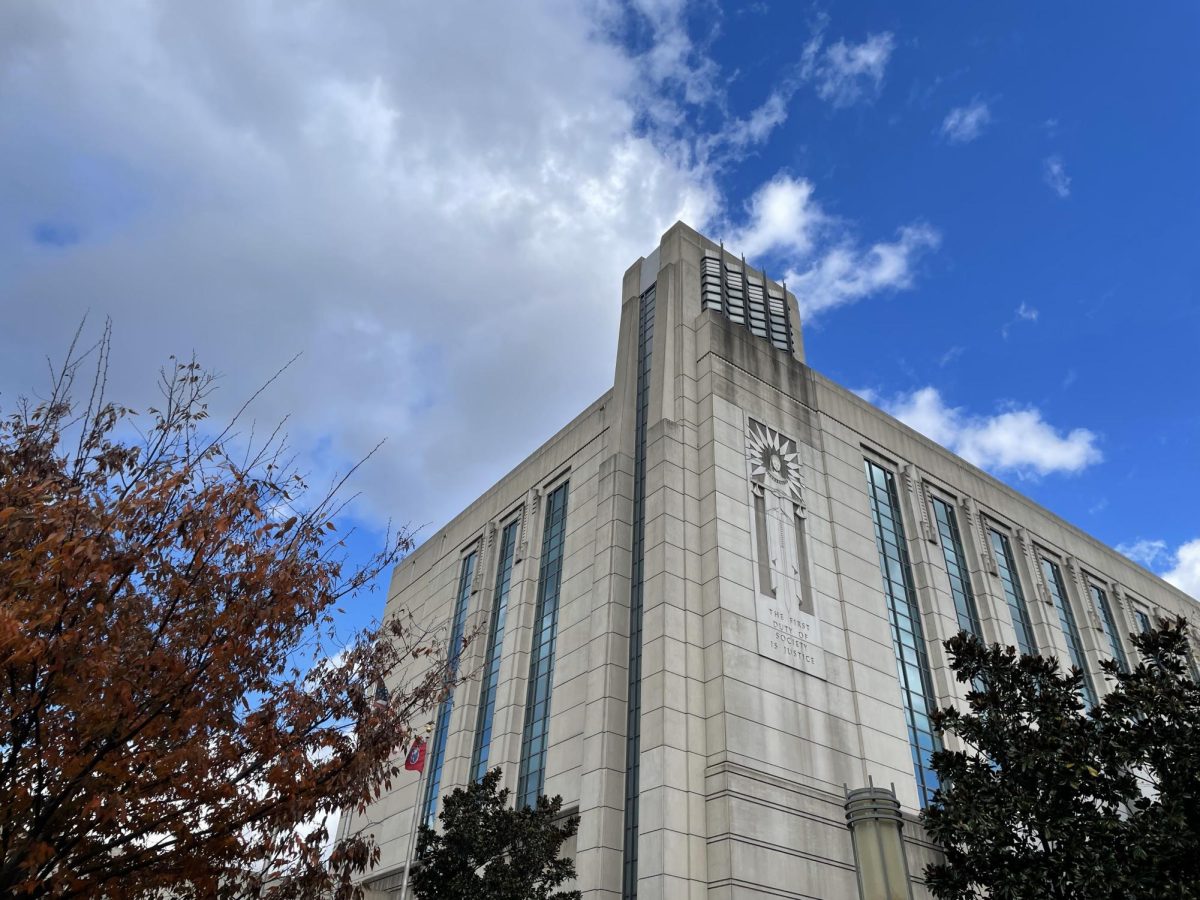
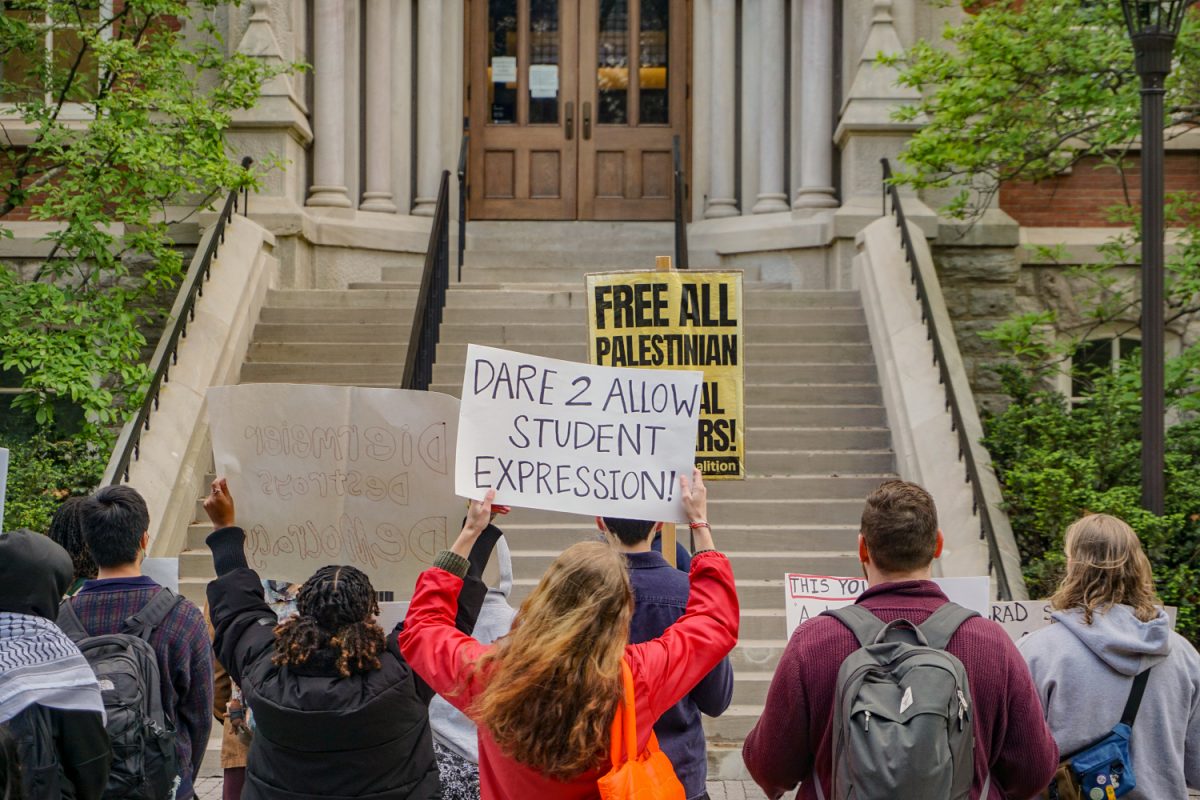
RAK • Nov 29, 2024 at 9:24 am CST
Students should continue to protest, and the faculty should continue to support free speech and critical thinking. Suppression is not compatible with the mission of any university.
Thersa Smith • Apr 12, 2024 at 12:07 am CDT
The overwhelming majority of people who use the phrase from the river to the sea are not calling for two peacefully coexisting states- which Palestinian leaders have rejected numerous times- but for the eradication of Israel. We have just seen what Hamas wants to do when they tear down the border.
RAK • Nov 29, 2024 at 9:22 am CST
your misinformation is startling. Please either keep your weird opinions to yourself or learn the truth.
Free Palestine • Apr 10, 2024 at 12:32 pm CDT
As a Jewish student who went to the protest, I am appalled that Vanderbilt Chabad used religious imagery like the shema, the shofar, and tefillin to promote their genocidal political agenda. It seems wrong to me and it’s a disgusting display of religious nationalism.
Israel does not keep Jews safe. It puts us in harm’s way. I constantly fear for the safety of my family in Israel. The sooner we realize that Israel will not protect us, the sooner we depart from the aberration of Zionism, the sooner we can achieve true peace. The Torah teaches us that further violence will not beget liberation.
I fully support the students who are facing unjust disciplinary action. Free Palestine.
Student • Apr 11, 2024 at 3:45 am CDT
Ari, how does a free Palestine and Hamas make your family safer?
Carlo Cau • Apr 11, 2024 at 10:55 am CDT
Free Palestine from Hamas.
Student • Apr 11, 2024 at 12:08 pm CDT
He hosts a tefillin wrapping table every week in the same spot. The Shema is said every time you wrap tefillin. I don’t see how his weekly table is promoting a “genocidal political agenda”.
William T. King III • Apr 11, 2024 at 12:09 pm CDT
This is so unintelligent. Nice try.
Tomo • Apr 15, 2024 at 6:01 am CDT
Yeah, you’re Jewish. Right. And I’m Martian.
A Jewish Vanderbilt Student • Apr 10, 2024 at 12:22 pm CDT
It’s concerning and distressing to me how the Rabbi is willing to compromise the religious sanctity and significance of symbols like the Shofar (which he blew in an attempt to drown out the protestors, and which was not mentioned in the article), as well as prayers like the Shema, all for purposes of defending a political entity, which is and has been, to put it extremely lightly, doing a lot of atrocious and horrific things, not only in the past 6 months, but for several decades at least.
Another Angry Jew • Apr 10, 2024 at 12:49 pm CDT
well said boss
Student • Apr 11, 2024 at 3:52 am CDT
Ari, please
A Jewish Vanderbilt Student • Apr 11, 2024 at 4:54 pm CDT
Who’s Ari?
RAK • Nov 29, 2024 at 9:22 am CST
what do you care, asking who is Ari. Do not attempt to intimidate fellow students please